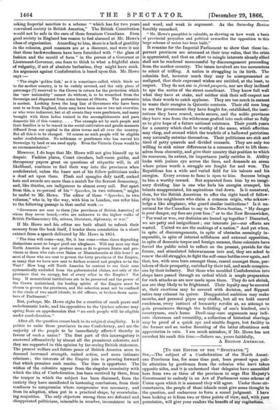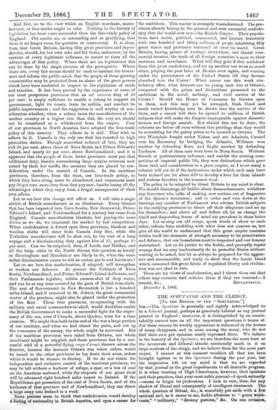[To THE EDITOR OF THE "SPECTATOR."] Stn,—'The subject of a
Confederation of the North Ameri- can Provinces has, for some time past, been pressed upon pub- lic attention by gentlemen from the colonies who have taken opposite sides, and it is understood that delegates have assembled here from two or three of the provinces to urge Her Majesty's Government to embody in an Act of Parliament some scheme of Union upon which it is assumed they will agree. Under those cir- cumstances, the people of these islands must give some thought to the question, and endeavour to form a sound judgment. I have been looking at it from two or three points of view, and, with your permission, will give your readers the benefit of my cogitations. Aid- first, as to the view which an English merchant, manu- facturer, or free-trader ought to take. Nothing in the history of legislation has been more successful than the free-trade policy of England. The results are so astounding and so gratifying, that there is no longer room for question or controversy. It is clear, then, that Great Britain, having fifty great provinces and depen- dencies, should, for her own sake and for theirs, endeavour, by the exercise of every legitimate influence, to secure to them all the advantages of that policy. Where there are no legislatures this can be done by the single exercise of the prerogative. Where there are, every fair means should be used to instruct the Gover- nors and inform the public mind, that the people of these growing communities may be protected from an abuse of the great powers which have been conferred in respect to the regulation of trade and taxation. It has been proved by the experience of some of our most prosperous provinces that an ad valorem duty of 10 per cent. is amply sufficient to enable a colony to support its government, light its coasts, train its militia, and conduct its public improvements ; and the suggestion is well worthy of con- sideration whether, when a colony taxes the manufactures of the mother country at a higher rate than this, the very act should not be considered as a withdrawal from the empire. Four of our provinces in North America have adopted the free-trade policy of this country. They adhere to it still. They wish to adhere to it. Canada is the only one that has resorted to high protective duties. Though somewhat reduced of late, they are still 50 per cent, above those of Nova Scotia and Prince Edward's Island, and nearly 40 per cent. above Newfoundland ; and it is apparent that the people of these latter provinces must pay that additional duty, besides surrendering large surplus revenues now raised by their low tariffs, the moment they are placed by con- federation under the control of Canada. In the maritime provinces, therefore, from the start, our free-trade policy, to which they have clung, must be abandoned, and consumers must pay 50 per cent. more duty than they pay now, besides losing all the advantages which they enjoy from a frugal management of their own affairs.
Let us see how this change will affect us. I will take a single article of British manufacture as an illustration. Every blanket that has been imported into Nova Scotia, New Brunswick, Prince Edward's Island, and Newfoundland for a century has come from England. Canada manufactures blankets, but payiug the same duties as we do, we command the market by fair competition. When confederation is forced upon these provinces, blankets and woollen cloths will enter from Canada duty free, while the Yorkshire manufacturer will be shut out, by the cost of a long voyage and a discriminating duty against him of 15, perhaps 2) per cent. Can we be surprised, then, if Leeds, and Halifax, and all the large cities in the North discuss this question as keenly as Birmingham and Manchester are likely to do, when the same unfair discrimination comes to tell on cotton goods and hardware?
• Let us see how this confederation, if adopted, will strengthen or weaken our defences. At present the Cabinets of Nova Scotia, Newfoundland, and Prince Edward's Island deliberate, and their Parliaments legislate, within cannon-shot of deep water, and can be at any time covered by the guns of British iron-clads. The seat of Government in New Brunswick is but a hundred miles inland, and if removed to St. John's, the great commercial centre of the province, might also be placed under the protection of the fleet. These four provinces, co-operating with the military and naval commanders-in-chief, would doubtless enable the British Government to make a successful fight for the supre- macy of the sea, even if Canada, above Quebec, were for a time overrun. We might thus hold to the end of the war a large portion of our territory, and when we had closed the ports, and cut up the commerce of the enemy, the whole might be recovered. But if the maritime provinces were ruled from Ottawa, our whole machinery might be crippled, and those provinces lost by a suc- cessful raid of a powerful flying corps d'armee thrown across the frontier, because the moment Ottawa was taken orders would be issued to the other provinces to lay down their arms, orders which it would be treason to disobey. If we do not retain the independent and exclusive control of the maritime provinces, we may be left without a harbour of refuge, a spar, or a ton of coal on the American seaboard, while the outposts of our great rival will be advanced eight hundred miles nearer to Ireland. If the Republicans get possession of the coal of Nova Scotia, and of the harbours of that province and of Newfoundland, they can throw a large army into Ireland in a week.
Some persons seem to think that confederation would develop a feeling of nationality in British America, and open a career for the ambitious. This matter is strangely nissunderstood. The pro- vinces already belong to the greatest and mast successful confede- racy that the world ever saw—the British Empire. Their popula- tions have social, political, commercial, and literary fraternity with two hundred and thirty millions of people inhabiting fifty great states and provinces scattered all over the world. Great Britain, having points of vantage everywhere, an liberal com- mercial treaties, the trade of all foreign countries is open to their- mariners and merchants. What will they gain if they withdraw from this great confederacy, and set up another too weal, to stand alone, playing the poor farce of Mexico over again, and existing under the protectorate of the United States till they become- absorbed into the Union? What career can this weak con- federacy offer, what honours can its young men win at Ottawa, compared with the prizes and distinctions presented to the in the naval, military, and civil service of the Crown ? Should the House of Commons be thrown open- to them, and this may yet be arranged, fresh blood and much varied knowledge may be drawn into the service of the State, and a career will then be opened to millions of British subjects that will make the Empire impregnable against domestic treason and foreign assault. But should this not be done, the colonists are better off even without this privilege than they would be scrambling for the paltry prizes to be secured at Ottawa. The two 1Vestphals fought under Nelson and are Admirals, Cunard won his Baronetcy by bridging the Atlantic, Williams won another by defending Kars, and Inglis another by defending Lucknow. All of these men were born in Nova Scotia. Without friends or parliamentary influence, and amidst the stirring com- petition of imperial public life, they won distinctions which gave them rank and consideration in a great empire, as I trust many a colonist will yet do if the institutions under which such men have been trained are let alone still to develop a love for these islands and zealous devotion to the common weal.
The policy to be adopted by Great Britain to my mind is clear. We should discourage all babble about dismemberments, withdraw any Governor who talks of making new nations out of fragments of the Queen's dominions; call to order and vote down at the hustings any metnber of Parliament who advises British subjects in the outlying provinces to throw off their allegiance and set up- for themselves ; and above all and before all, let us change the timid and desponding frame of mind too prevalent in these latter days. Let us sing our old songs, speak words of cheer to each, other, refrain from meddling with what does not concern us, but give all the world to understand that this great empire contains within itself the elements of strength necessary to its preservation and defence, that our boundaries must be respected and our honour- maintained. Let us do justice to the feeble, and promptly repair wrongs that we may inadvertently do to powerful States without waiting to be asked, but let us always be prepared for the aggres- sive and unreasonable, and ready to show that the heroic blood which cemented this great fabric of regulated liberty and civiliza- tion was not shed in vain.
These are my views of confederation, and I throw them out that others may examine and criticize them if they are unsound.—I B
December 4, 1866.































 Previous page
Previous page